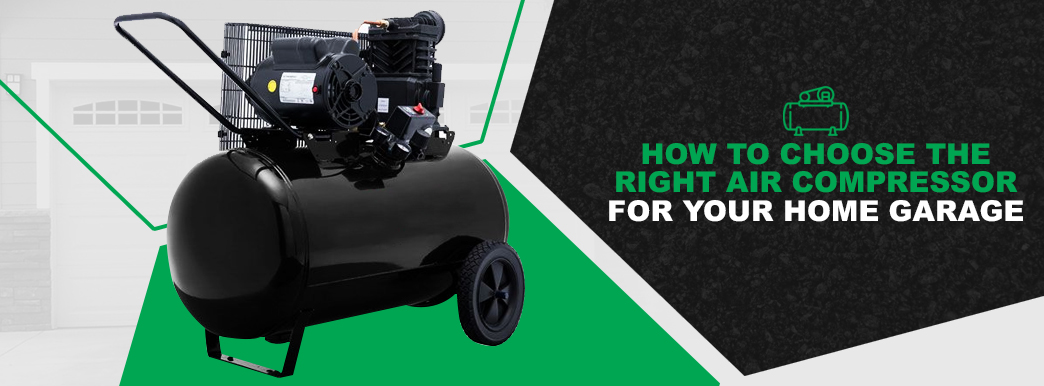A handy and necessary instrument like an air compressor can significantly improve your garage workstation. An air compressor has several uses, including powering pneumatic tools, inflating tires, and even painting. Nevertheless, picking the ideal air compressor for your garage can be challenging given the range of types, sizes, and functions that are offered on the market. In this buyer’s guide, we’ll go through the important elements to take into account so that you can make a purchase that matches your unique needs.
Identify Your Needs
Identifying your unique needs is the first step in choosing the best air compressor. Take into account the kinds of jobs you’ll be doing in your garage. Do you require it to power tools, paint, inflate tires, or a mix of these things? You may reduce your selections and select a compressor with the proper characteristics by being aware of your major needs.
2. Keep the power source in mind
Electric and gas-powered variants of air compressors are among the available power sources. While gas-powered units are more portable and ideal for outdoor and isolated areas, electric compressors are more practical for inside use and need a power source. Select the power source that best suits your garage’s configuration and preferred uses.
3. Consider Tank Size
The volume of compressed air that an air compressor can store before needing to be recharged depends on the tank capacity. A larger tank is advantageous for operations that demand a constant flow of air because it lessens the frequency of motor cycles. Larger tanks, however, might require more room in your garage. When selecting a tank size, take into account the constraints of your workspace and the types of jobs you’ll be carrying out.
4. Verify the CFM (Cubic Feet per Minute) rate. Rating
How much air the compressor can deliver per minute is indicated by its CFM rating. There are various CFM levels required for various equipment and jobs. For example, precise CFM requirements are needed for pneumatic tools to operate at their best. Make sure the air compressor you select has the capacity to deliver the CFM needed for the tools you intend to utilize.
5. Calculate the PSI (pounds per square inch) value.
The PSI rating shows the highest pressure the compressor is capable of producing. It’s critical to pick a compressor whose PSI rating meets or surpasses the demands of the equipment and jobs you want to use. Remember that some instruments, like paint sprayers, require more PSI than others.
6. Sound Volume
Air compressors can be noisy, and if your garage is close to a residence, this issue becomes even more crucial. If noise is a concern for you, take the compressor’s noise level into consideration and choose models with lower decibel levels.
Portability 7.
Portability is a key factor to take into account if you intend to transfer your air compressor about the garage or take it to new areas. For simpler portability, look for versions with handles, wheels, and compact designs.
8. Oil-Lubricated vs. Oil-Free
Both oil-free and oil-lubricated air compressors are available. Oil-free compressors are easier to maintain and work well for simple to medium-sized tasks. However, oil-lubricated compressors are typically more robust and more appropriate for demanding operations. When picking between the two, take into account the upkeep requirements and planned use.
9. Sturdiness and Construction Quality
Purchasing a sturdy, high-quality air compressor will guarantee that it can resist the demands of your garage’s activity. Choose models that are long-lasting, have dependable parts, and are built solidly.
10. Extra Qualities
Additional features on some air compressors can improve your experience. Built-in air filters, pressure regulators, automatic shutoff mechanisms, and programmable pressure settings are a few examples. Check if these features suit your requirements and tastes by evaluating them.
11. Budgetary Factors
Your budget is a big factor in the decision-making process, just like with any purchase. Establish a budget range and look into choices that fit inside it. Although it may be tempting to choose the least expensive choice, remember that a higher-quality compressor will operate better and last longer, saving you money over time.
12. Research Recommendations and Read Reviews
Read reviews written by customers who have used the air compressor models you are debating before making a final choice. Their opinions can offer insightful data about functionality, dependability, and any prospective problems.
13. Guarantee and client assistance
Normally, a dependable manufacturer provides a warranty that covers flaws and failures. Make sure you comprehend the warranty’s conditions and the availability of customer service in case you run into any problems.
It’s important to carefully analyze your unique requirements, available space, and spending limit when choosing the ideal air compressor for your garage. You may improve your garage workspace and enable you to complete a variety of activities with ease and efficiency by carefully weighing elements including power source, tank size, CFM rating, and additional features. It’s important to keep in mind that a good air compressor can have a big impact on the caliber of your job and the general functionality of your garage.
